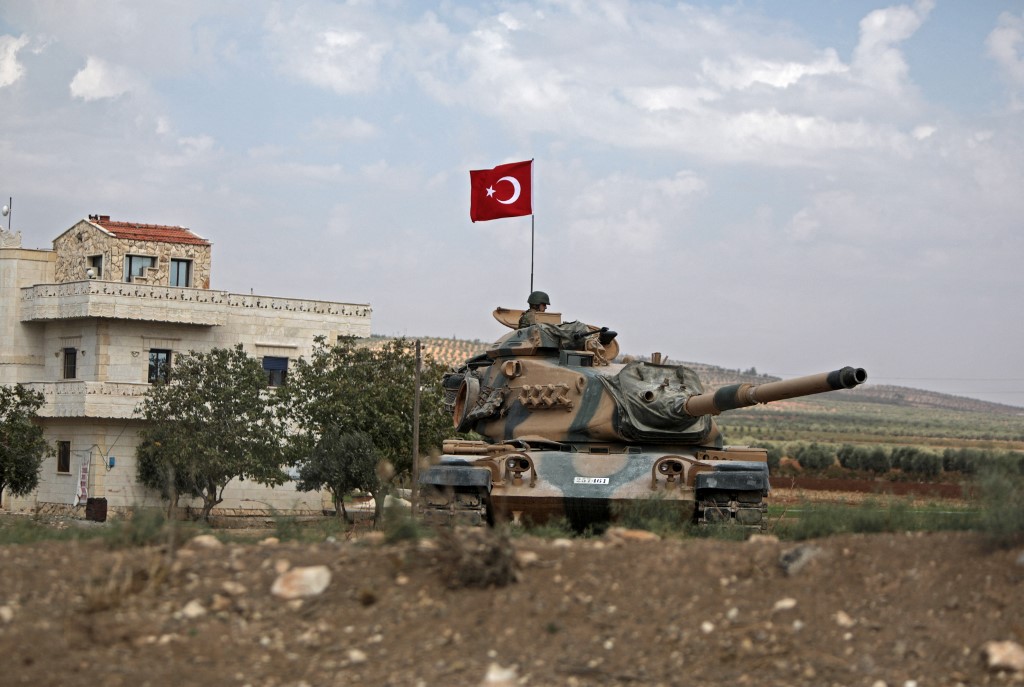Turkey and Israel set up hotline over Syria tensions

Turkey and Israel have established a hotline to prevent possible military flare-ups and misunderstandings in Syria, following talks held between the two countries in April, two sources familiar with the issue told Middle East Eye.
Turkish and Israeli officials have been meeting in the Azerbaijani capital Baku since April for direct talks to resolve their differences regarding Syria.
While Ankara emerged as a key actor following the ouster of Syrian President Bashar al-Assad in December, the Israeli government expressed deep concern over the new status quo, publicly opposing any Turkish military deployment to the country.
Several individuals and security sources from Prime Minister Benjamin Netanyahu’s government repeatedly referred to Syrian President Ahmed al-Sharaa's government as "radical jihadists" and stated that Israel would not tolerate Turkey taking over airbases near Palmyra, a key location in the fight against the Islamic State group (IS).
However, both countries engaged in talks in April, with Azerbaijani mediation, to work out a deconfliction mechanism to avert future possible military conflict.
New MEE newsletter: Jerusalem Dispatch
Sign up to get the latest insights and analysis on Israel-Palestine, alongside Turkey Unpacked and other MEE newsletters
While further talks, a fifth round, are scheduled for later this month on a broader deconfliction deal, a 24/7 hotline was established in April to quickly resolve any accidental military tensions.
Turkish defence ministry sources, speaking to MEE, said they had nothing to announce yet.
Although Turkish officials have repeatedly stated they would not allow a "sphere of influence" in Syria that would permit countries like Israel to strike areas at will, sources said the discussions are focusing on finding a way forward that could satisfy both countries' concerns.
'Palmyra line'
A source familiar with the negotiations said the Israeli government was largely comfortable with Turkey deploying land forces, including tanks and infantry, in Syria.
However, the main question was where Ankara would place its air defence systems and radars, which could monitor Israeli air operations.
"The talks progress positively and the discussion is focusing on the so-called Palmyra line," the source said. "Those bases represent a grey zone; the Israelis could be amenable to Turkish deployments north of that area."
Last month, Ankara moved to take over the T4 airbase near Palmyra to deploy armed drones and surveillance aircraft, intending to help Damascus fight IS as part of a regional coalition that includes Iraq, Lebanon and Jordan. This move triggered an Israeli air campaign that struck the base multiple times before Turkish officials moved in, damaging the tarmac and destroying hangars.
The Turkish military has drafted plans to temporarily deploy a Russian-made S-400 air defence system to the base to protect it and deter possible attacks. This has concerned Israeli officials, who perceive it as an attempt to monitor and potentially expose their aerial operations in real-time.
Ankara says it needs the bases to easily and quickly track and strike IS groups operating near Palmyra in the desert. However, Turkish Foreign Minister Hakan Fidan has repeatedly said that Ankara would not intervene if the Syrian and Israeli governments found a way forward.
One of the main sticking points for Israel is maintaining the operational capability to fly over Syria without being detected by Turkish radars, should Israel decide to strike Iranian nuclear assets in the coming months.
Separately, Israel and Syria are holding their own talks in Baku to resolve their differences, two sources familiar with the issue confirmed to MEE.
The talks, which are supported by Turkey and Azerbaijan, focus on confidence-building measures between the two countries.
As part of these efforts, Reuters reported this week that Syria had handed over a trove of documents and photographs belonging to Israeli agent Eli Cohen, who was hanged in a downtown Damascus square six decades ago after collecting intelligence on Syrian military plans.
middleeasteye.net